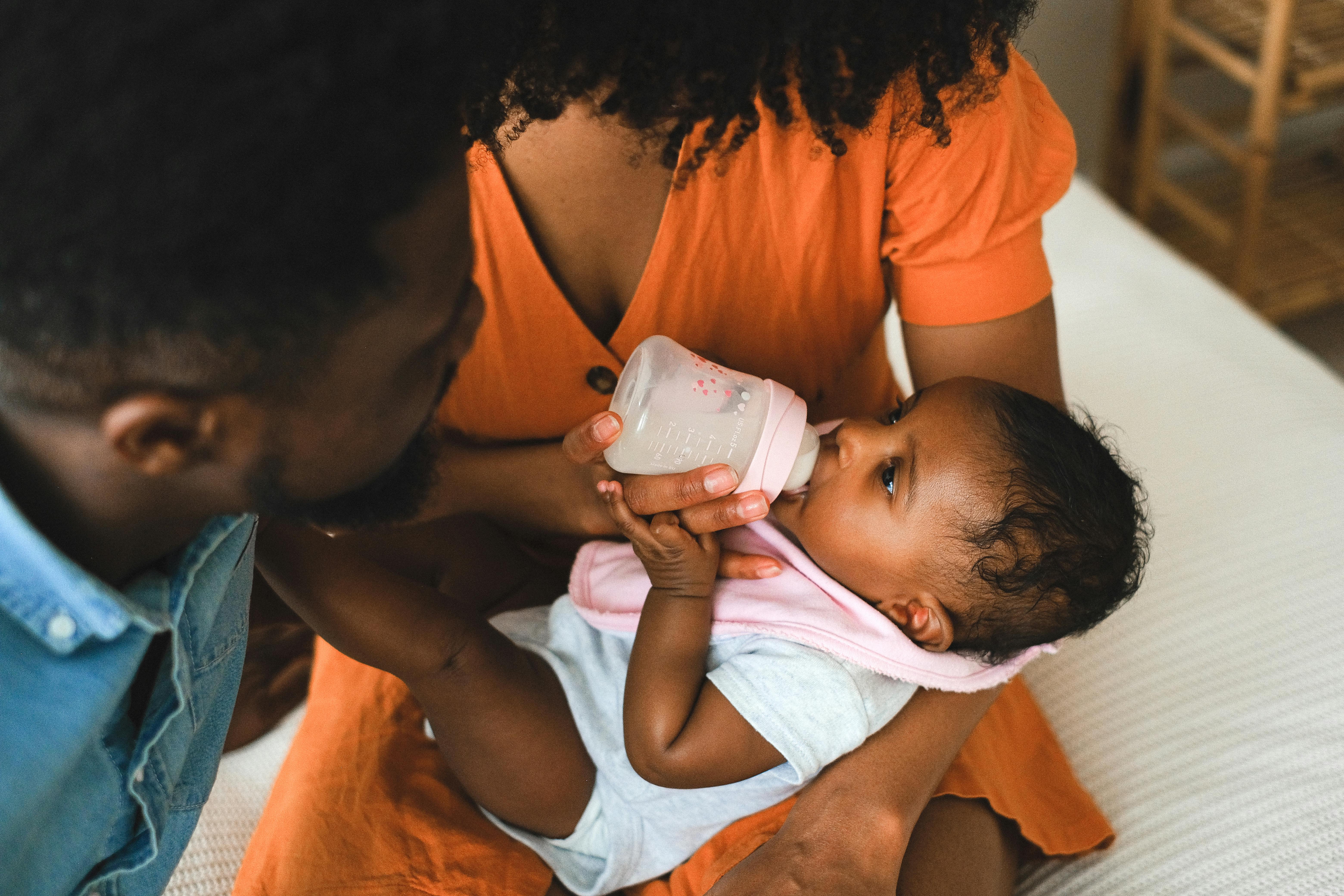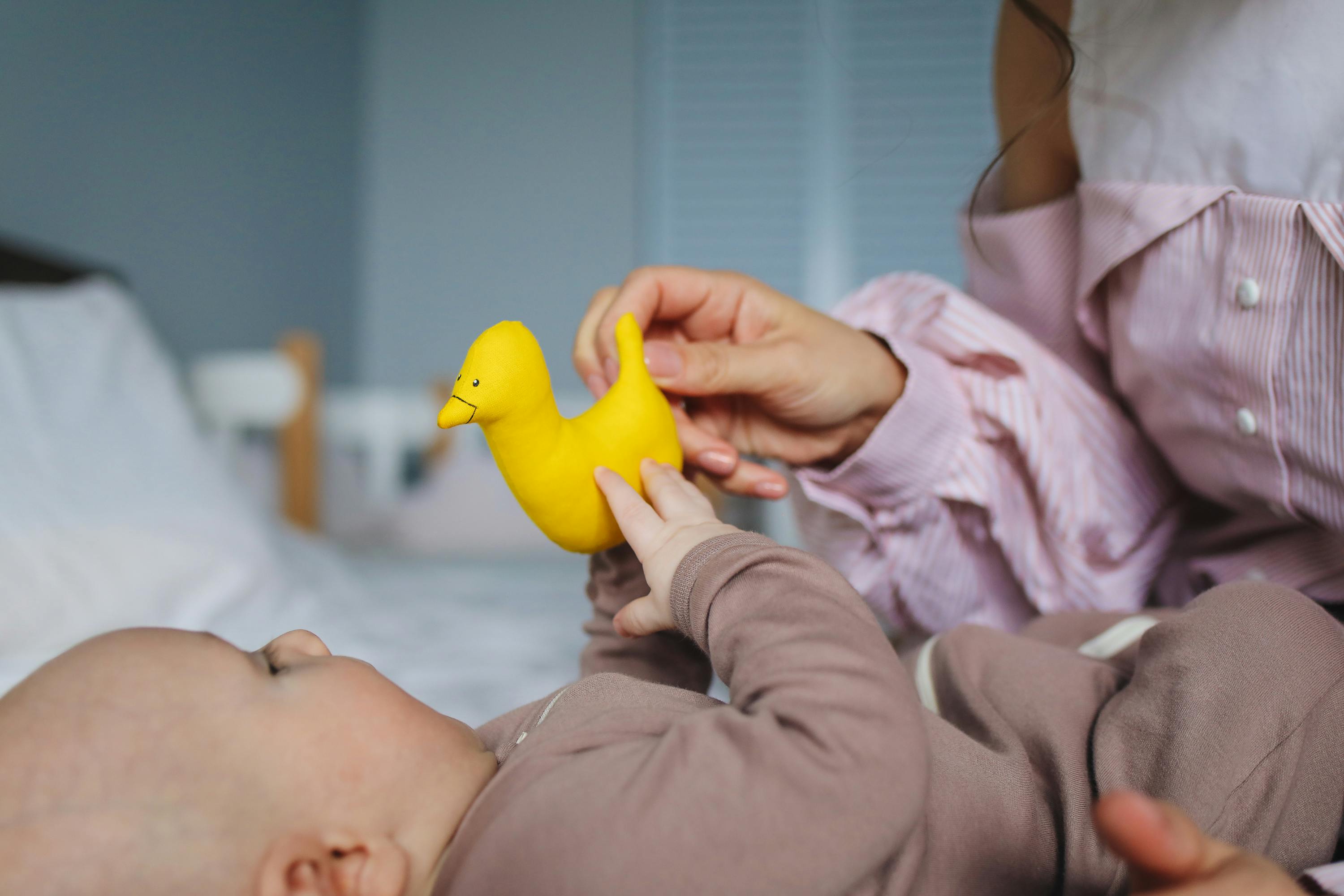One of the most common pieces of advice new parents hear is "sleep when the baby sleeps." Seasoned parents often fail to mention that you'll also be up when the baby is up - even if the baby is crying in the middle of the night.
It's jarring when your baby wakes up crying hysterically, and it can be difficult to problem solve when you're half-awake and running on empty. There are many reasons a baby might cry, but not all are negative. Often, a baby crying at night is experiencing a developmentally appropriate period of sleep regression.
Can you tell the difference between developmentally typical late-night crying and a problem?
We've created this guide to help you understand Why is my baby waking up screaming? And more importantly, what can you do to help? We'll detail five reasons your little one might be waking up and share techniques to calm them down.
Why Is My Baby Waking Up Screaming?
There are top 5 common reasons why babies wake up crying hysterically at night:
1. Hunger
Babies, especially during growth spurts, may wake up needing extra feedings.
2. Discomfort
A wet diaper, teething pain, or feeling too hot or cold can lead to restless sleep.
3. Night Terrors
These sudden, intense episodes happen in deep sleep and can cause inconsolable crying.
4. Separation Anxiety
As babies grow, they become more aware of their surroundings and may cry for comfort.
5.Developmental Milestones
Learning new skills like rolling over, crawling, or talking can temporarily disrupt sleep.
Identifying the root cause is the first and critical step in helping your baby sleep peacefully through the night.
What to Do When Your Baby Wakes Up Screaming?
Check for Immediate Needs (Hunger, Discomfort, or Wet Diaper)

Busy babies' needs change daily, and their activity levels can affect their feeding patterns. Growth spurts or extra energy expenditure may leave them hungrier at night, leading to unexpected wake-ups.
To prevent hunger-related night wakings, try:
- Adjusting feeding schedules to include a dream feed before you go to bed
- Offering longer, more filing feedings during the day to ensure your baby gets enough calories.
Moreover, check for other discomfots - such as a wet diaper, teething pain, or room temperature - to help your baby sleep more soundly.
Soothe Nightmares and Night Terrors

Everyone wakes up during the night sometimes, but the difference is that adults know how to fall back asleep on their own—babies are still learning. If your little one wakes up screaming and needs you to hold, rock, or nurse them, they may be seeking comfort rather than experiencing a true sleep disruption.
Here are some gentle ways to help your baby settle more independently:
- Offer reassurance with a calm voice or gentle touch, but try not to overstimulate them.
- Try gradual sleep training techniques to encourage self-soothing and ease nighttime reliance on rocking or nursing.
- Stick to a consistent bedtime routine to help your baby feel safe and secure.
With time and patience, your baby will gain confidence in self-soothing, leading to more restful nights for both of you.
Help Your Baby Feel Secure at Night

As your baby grows, so do their cognitive abilities. One of the most significant milestones is the development of object permanence - the understanding that people and things still exist even when they’re out of sight. This typically happens around eight months old and is an exciting step toward abstract thinking, which later helps with reading and math skills.
However, this new awareness can also bring separation anxiety, especially at night. Separation anxiety can peak at certain developmental stages, making night wake-ups more intense. If your baby wakes up crying, it might be because they realize you're not there and miss your presence.
How to help your baby feel secure at night, try:
- Encourage object permanence during the day by playing peek-a-boo or hiding and finding toys.
- Comfort your baby with a gentle touch, soothing voice, gentle lullaby or a familiar object like a favorite blanket to help them feel safe.
- Provide brief check-ins if they cry out, reassuring them with your voice without fully waking them. This lets them know you're there while helping them learn to settle back down.
- Gradually encourage self-soothing by giving them a moment to settle before picking them up, offering a calm voice or gentle touch to reassure them while fostering independence in falling back asleep.
Want to understand separation anxiety better? Learn more here: separation anxiety in babies
With time, your little one will grow more confident in knowing that even when you're out of sight, you're never truly gone.
Adjust the Sleep Routine for Better Rest: Notice Development and New Milestones
As your baby reaches new developmental milestones, their sleep needs may change. For example, babies who are learning to sit up or stand may become more active at night, which could lead to increased wake-ups as they practice new skills.
Development is not only physically taxing but also mentally demanding. A rapidly developing brain may cause your baby to wake up excited or frustrated, sometimes practicing new skills during the night, like pulling themselves up or crawling.
While these milestones are exciting, they can temporarily disrupt your baby's sleep routine. Here's how to adjust the sleep routine to accommodate these changes:
- Adjust nap times: If your baby is more active during the day, they may need more structured naps to prevent overtiredness, which can lead to harder nighttime sleep.
- Create a predictable bedtime routine: A consistent routine can provide comfort and security, signaling to your baby that it’s time to wind down.
- Offer extra reassurance at night: As your baby learns new skills, they may need a little more help settling back to sleep. Comforting them with your voice or a gentle touch can ease them through these temporary disruptions.
- Be flexible with wake-ups: If your baby is waking up to practice new skills, allow them a few moments to settle on their own before rushing in to help, encouraging self-soothing where possible.
With time, your baby will adjust to these developmental changes, and their sleep patterns will stabilize once again.
Monitor Patterns and Use Technology for Insights
It can be heartbreaking to hear your baby cry, especially when it’s difficult to figure out the cause. Babies cry for many reasons, and sometimes it takes patience and focused observation to uncover what’s behind their distress. More often than not, their cries are innocent and developmentally appropriate, signaling changes that are part of their growth.
Using a smart baby monitor like Pixsee can provide valuable insights into your baby’s needs by tracking sleep patterns, recognizing wake-up triggers, and offering real-time data. Features like cry detection and temperature monitoring give you the tools to quickly identify whether your baby’s discomfort is related to hunger, a dirty diaper, temperature changes, or something else.
With this technology, you can gather a clearer understanding of your baby’s sleep cycles and what might be causing their nighttime wake-ups. This allows you to respond quickly and thoughtfully, ensuring your little one feels secure and supported throughout the night.
When to Call the Pediatrician
Sometimes, your baby's crying can be a sign of physical discomfort, such as pain from teething, ear infections, or a stuffy nose. Babies cry to communicate their discomfort, and teething pain is a common culprit.
If your baby's crying is prolonged, frequent, or accompanied by fever or other concerning symptoms, it's important to consult your pediatrician. There could be an underlying issue like reflux, an infection, or something else that needs attention. Your pediatrician can help identify the cause and recommend ways to ease discomfort, such as pain relief for teething or guidance for other conditions.
Always trust your instincts. If something feels off, don't hesitate to reach out to your pediatrician to ensure your baby's well-being and support better sleep.
Only the best baby monitors, like Pixsee, give you a crystal-clear view into your baby's world. Pixsee helps new parents observe their baby's development, offering peace of mind day or night.
FAQs About Baby Wakes Up Screaming
1. Is it normal for babies to wake up screaming at night?
Yes, it’s normal for babies to wake up screaming, especially in the first year. This could be due to discomfort, hunger, teething pain, or even separation anxiety. As babies grow, they may also wake up feeling scared or frustrated. However, if the crying persists or is accompanied by other symptoms like fever, you might want to consult your pediatrician for guidance.
2. Why does my baby wake up crying hysterically in the middle of the night?
Babies may wake up crying hysterically due to various reasons, including discomfort from teething, illness, hunger, or even emotional distress like separation anxiety. It’s also possible that they’re waking up in a different sleep cycle and are confused or frightened when they realize you’re not around. If crying continues without any clear cause, make sure to check for other symptoms and consult a pediatrician if necessary.
3. How do I calm a hysterical baby at night?
To calm a hysterical baby at night, start by addressing their basic needs—check for hunger, discomfort, or a wet diaper. Comfort your baby with a gentle touch, soothing voice, or a familiar item like their favorite blanket. You can also try a lullaby to provide reassurance. If the crying doesn’t subside, consider giving them a moment to self-soothe, but always be close by to offer comfort if needed. If the crying persists or seems unusual, contact your pediatrician.
4. When should I be concerned about my baby’s crying and call the pediatrician?
If your baby’s crying becomes frequent, prolonged, or is accompanied by other concerning symptoms like fever, vomiting, or unusual discomfort, it’s time to consult your pediatrician. This could indicate underlying issues like reflux, ear infections, or other medical conditions that require attention. Your pediatrician can offer advice on how to relieve discomfort and improve your baby’s sleep.
5. Can a baby monitor help me understand why my baby is crying at night?
Yes, a baby monitor with smart technology, such as Pixsee, can help track your baby’s sleep patterns, detect crying, and monitor their surroundings for temperature changes. These features can provide insights into why your baby might be waking up, whether it’s due to discomfort, temperature fluctuations, or other factors. Monitoring these patterns can help you address the issue promptly and ensure your baby gets better sleep.
Visit Pixsee Shop and Amazon online store to learn more about how parents use Pixsee to make the right choices for their little ones.








